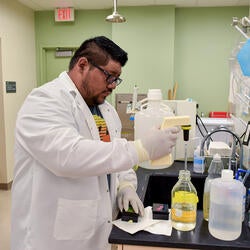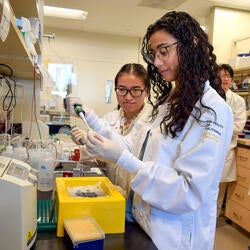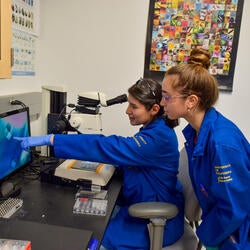Biochemistry is the study of biological processes at the molecular level. Biochemists combine the disciplines of biology and chemistry to study the structure, composition, function, and chemical reactions of molecules and macromolecules within living systems, including ways to control function and reactivity.
What makes Biochemistry unique at UCR?
You can be as biologically or chemically oriented as you like and still obtain a degree in Biochemistry. If you like biology, you can take many elective courses in biology. If you like chemistry, you can take many elective courses in chemistry. There are three emphases in the Biochemistry major. The Biology and Chemistry emphases prepare students primarily for careers in research. Undergraduate research is encouraged for students in these emphases. The Medical Sciences emphasis includes elective courses recommended particularly for students planning careers in the Health Professions.
In general, what are Biochemistry professors investigating?
Biochemists study cutting-edge problems across a wide range of disciplines to advance our understanding of the biological processes that make life possible. This includes determining how living organisms obtain energy from foods, characterizing the fundamental changes that occur in disease, developing methods to diagnose and overcome disease states, determining the mechanisms of drug actions, gene expression, and genome stability, explaining the basis of heredity, and determining how biological molecules interact with each other and the environment. The work of biochemists is vital in many areas of science, from medicine to agriculture, and has led to major breakthroughs in the development of drugs, vaccines, and diagnostic tools.
Why Biochemistry at UCR?
The coursework in the Biochemistry major represents a unique combination of breadth and depth. There is a strong emphasis on quantitative physical understanding of biomolecular processes. Even within the umbrella of the major, there is a choice of concentration to match career goals, with tailored coursework and a very wide range of electives to align with many different career interests.
Biochemistry MS Programs
The Biochemistry Department offers a stand-alone MS Degree. Students may either develop and write a MS thesis under the supervision of a faculty member or earn a MS degree by comprehensive examination.
Biochemistry research at UCR
Interactions between RNA polymerase and ribosomes, chromatin remodeling and regulatory RNA pathways, molecular mechanism of photosynthetic O2 formation, DNA helicases and translocases involved in DNA repair pathways, molecular mechanisms of oxidoreductase enzymes, biological electron transfer, molecular mechanisms by which p53 functions as a transcription factor, molecular processes and epigenetic mechanisms involved in regulation of gene expression, mechanistic principles and phenotypic impact of RNA-binding proteins, regulation and function of genome activity via histone modifications, molecular mechanism of eukaryotic translation initiation, role of small molecules in complex ecosystems, epigenetic regulation and host-pathogen interaction.
What industries can I get into with a Biochemistry degree?
- Health professions including medical, dental, veterinary, pharmacy, or optometry schools
- Careers conducting basic or applied research at colleges, universities, government agencies (e.g., NIH, USDA, EPA, FBI)
- Pharmaceutical companies
- Biotechnology companies
- Teaching at colleges, universities, or secondary schools




